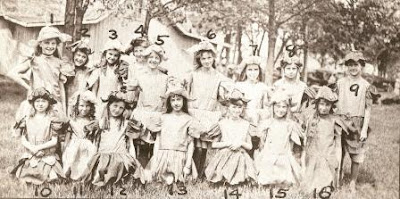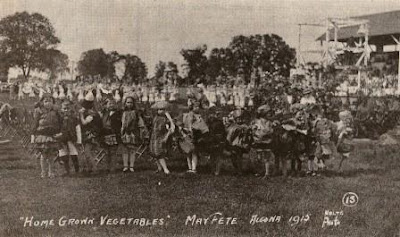How
many of you have ever seen local picture postcards labeled “May Fete – May 17,
1915”? The photos are quite eye
catching-- children dressed as various flowers and vegetables, chickens and
blackbirds, as well as farmers, Indians and prize fighters. Over the years I have seen many postcards
bearing this label and wondered what type of celebration would include the
elaborate costumes pictured. Since 2015 marks its centennial, it seems like a good time to do a little
investigating to see what the May Fete was all about.
Library Aid Society Fundraiser
 |
| Flower Girls |
Sponsored
by the Library Aid Society as a fundraiser, the production, authored by Mrs. E.
B. Wilson of Jefferson, Iowa, was originally scheduled to be presented on
Friday, May 14th. Souvenir
buttons were sold for 25¢ each and served to admit the wearers to the fete. They were about the size of a nickel and
featured the state flower in the center on a blue background with the saying
“The World is Better for its Play Days” wrapped around the edge. One could also be admitted to the
extravaganza on the day of the event for the payment of 25¢.
Over
six hundred men, women and children were needed to execute the extravagant program. The city school teachers assisted the Library
Aid Society in the production. All of
Kossuth County was asked to participate in the fete and the Algona business
houses agreed to close between the hours of 2 and 5 p.m. Thousands were expected to attend. And then, as is often the case in Iowa in the
spring, weather intervened. Heavy rains
fell on Thursday evening, May 13th, and Friday dawned with a
drizzling rain. The occasion was
regretfully postponed until Monday, May 17th.
The celebration begins
The
big day finally arrived, although quite cool for an outdoor event. By 2 p.m. the participants were ready. The parade formed on the Carnegie Library
lawn. Led by the Algona Military band,
the beautiful floats passed through the business district on their way to the
fairgrounds. The pageant was staged in
front of the grandstand, taking up about two and a half acres of land. The grandstand was full of spectators, automobiles
lined the fences, and hundreds of people were seated on the grounds near the
Floral Hall.
The
prologue presented the history of Kossuth County and was entitled, “Our
Yesterdays.” It began with a band of
Indians who made camp complete with the men performing a war dance and the
squaws setting up the tepees. They were
followed by emigrants driving prairie schooners with signs such as “Bound for Kossuth
– Land $1.25 an acre, 1854” emblazoned on the sides. Other presentations included a log cabin
scene representing settlement and the uncertain time of the Civil War.
 |
| Parade Float |
The
floats then passed in review followed by four delightfully decorated automobiles. The first was decorated in the national
colors and carried several Civil War veterans.
The next marked the introduction of United States mail service and was
filled with mail and packages and another carried several early settlers of the
county and members of the Library Aid Society.
Still another brought forth much applause from the crowd as it passed, displaying
banners with the words “Votes for Women” and bearing members of the Women’s Christian
Temperance Union.
After the floats and autos had passed, the couriers were the first to arrive. They consisted of twenty young ladies who performed drills and counter marches. A group of boys representing florists came next, bearing hoes and sprinklers. They were follows by August Huenhold who brought his home grown vegetables which consisted of a number of youngsters dressed for the theme.
After the floats and autos had passed, the couriers were the first to arrive. They consisted of twenty young ladies who performed drills and counter marches. A group of boys representing florists came next, bearing hoes and sprinklers. They were follows by August Huenhold who brought his home grown vegetables which consisted of a number of youngsters dressed for the theme.
Farmers and agriculturists were represented by another group of boys wearing overalls and straw hats and carrying hoes.
They were followed by children dressed as chickens and blackbirds. Girls wearing aprons declaring “Good Cooks are the Angels of the County” passed by followed by boys dressed in white pulling a cart containing a churn and milk pails and dairy maids carrying banners setting out the number of pounds of butter manufactured in 1914 by the creameries located in the county. Many groups of children clad in various costumes such as flowers, butterflies and bees passed in review.
And
then, “Miss Iowa” arrived in a handsome car decorated with two white doves of
peace. Fittingly, Miss Iowa was
portrayed by Miss Sheridan, the city librarian.
To honor her, a unit of young ladies representing all 99 Iowa counties
entered, each bearing a wand with an ear of corn. A drill was presented by a band of boys
dressed as sunflowers. The next group
demonstrated the spirit of play and consisted of little girls with their dolls
and boys with baseballs and the like. A
portion of the infield had been fenced into individual sections for each
individual group to gather once they had passed before the grandstand which at that time faced west. As the parade drew to a close and each group
was in their assigned section, the scene created by their colorful costumes was
quite spectacular.
The program begins
After
the entire troupe had paraded before the delighted crowd, the real program
began. A large platform had been erected
in front of the grandstand which was now occupied by Miss Iowa and her
attendants. Each group then appeared
individually on stage and presented drills, dances and songs accompanied by piano
and the military band. This even
included a re-enactment of the Jack Johnson-Jess Willard prize fight by two little
fellows, creating much merriment. Amid
patriotic songs and music, the United States flag was raised to close the
program.
 |
| Jackson - Willard Prize Fight |
According
to the news reports of the time, an outdoor program such as this had never
before been presented in Algona.
Attendance predictions for the original advertised date had been
estimated at 4500. Due to the
postponement because of the inclement weather, numbers were drastically
reduced. Actual tickets sold were 1432,
plus hundreds of children and all of the adults involved in the program were
admitted free. After deducting all
expenses, the Library Aid Society was able to raise a little over $300 to be
used for library improvements.
 |
| Story Book Characters |
Harry
Nolte, the well-known local photographer, appears to have taken photos of
almost all of the groups featured in the fete.
He was able to preserve the memories of a very special occasion in the
history of Kossuth County. The postcards
created from the images he captured are able to bring this event alive once
again, one hundred years later.
If anyone has any of the original Nolte postcards from the May Fete and would like to send a scan of it, I will be happy to share it on the KCHB Facebook page.
Until next time,
Jean (a/k/a KC History Buff)
If anyone has any of the original Nolte postcards from the May Fete and would like to send a scan of it, I will be happy to share it on the KCHB Facebook page.
Until next time,
Jean (a/k/a KC History Buff)
If you enjoyed this post, please don’t forget to “like” and SHARE to Facebook. Not a Facebook user? Sign up with your email address in the box on the right to have each post sent directly to you.
Reminder: The posts on Kossuth County History Buff are ©2015 by Jean Kramer. Please use the FB “share” feature instead of cutting/pasting.




No comments:
Post a Comment